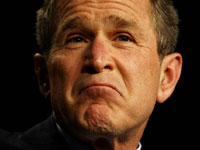 Many of us put political differences aside following the attacks of September 11th and trusted our national leadership would rise to the occasion of unifying the nation and the international community to face the threat to our nation and the civilized world. Disappointment turned to a sense of betrayal as the administration used the tragedy for partisan advantage and as a justification for a number actions both domestically and abroad that were neither wise or within our democratic tradition.
Many of us put political differences aside following the attacks of September 11th and trusted our national leadership would rise to the occasion of unifying the nation and the international community to face the threat to our nation and the civilized world. Disappointment turned to a sense of betrayal as the administration used the tragedy for partisan advantage and as a justification for a number actions both domestically and abroad that were neither wise or within our democratic tradition.Jonathan Rauch was one of those whose hopes were dashed. He writes,
Five years ago, with the ruins of the Twin Towers still smoking, manyRauch examines the current fiscal mess, the war in Iraq, the decline in our international reputation and the extralegal war on terrorism the President is running out of his back pocket. He guesses it will take a decade or two to undo the damage done by this administration although the President has a little time left to undo some of the damage himself if he is luck enough to have a Democratic Congress to help.
Americans-I should own that I was one of them-looked at Bush and thought they
saw a Churchill, or at least a Truman: a leader fortuitously equipped for a
difficult job at a critical moment. Bush's partisans are still holding out for
misunderestimated greatness, to be vindicated in the end. They think Bush will
be to the war on jihadism what Truman was to the Cold War: the guy who
established the course that will see the country through decades of peril.
To those disinclined to suspend judgment for fifty years, however,
Bush's course is looking less like a long road than a dead end. Even many
conservatives have lost faith; in a recent interview with CBS News, no less a
conservative luminary than William F. Buckley declared, "There will be no legacy
for Mr. Bush." For the disenchanted-again, including me-the relevant points of
reference now are not Churchill or Truman but Nixon and Carter.
One of the best ways to judge a president is to ask, Did he solve
more problems than he created? This test is more severe than it may seem,
because presidents are prone to mischief and grandiosity. With Presidents
Reagan, Bush Senior, and Clinton, the country had a good run. Reagan curtailed
inflation and rebuilt U.S. strength; Bush broke the back of the deficit and
closed out the Cold War peacefully; Clinton finished the fiscal cleanup and
managed to assert U.S. supremacy while enhancing U.S. popularity. All made
mistakes, but they got more right than wrong. Nixon and Carter, on the other
hand, both did some good things (Nixon went to China, Carter deregulated
transportation); but both, in the end, turned in negative balance sheets.
Read the article here.
1 comment:
Carter and Brezinski gave us Bin Laden when he decided to fight a war in Afganistan with proxies.
Nixon and Kissenger gave us the collapse of Iran we he aligned us with the Shah.
Great group.
...the decline in our international reputation...
We shamefully abandoned hundreds of thousands of Shia to slaughter after Gulf 1... our reputation wasn't so great, at least with Iraqi Shia....
Post a Comment